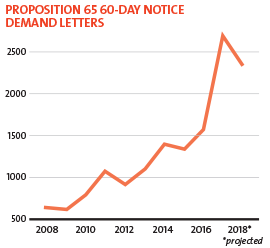BROADER LEGAL ISSUES FURTHER STACK THE DECK AGAINST DEFENDANTS
ATTACK ON ARBITRATION
The California courts and legislature have long attempted to undermine the right of employers and employees to enter into arbitration agreements.
Despite the U.S Supreme Court’s clear rulings finding arbitration agreements are enforceable and may not be disfavored by state laws, the California legislature again attempted to bar employers from requiring employees to sign agreements to arbitrate claims.
Assembly Bill 3080 passed the state Assembly and the Senate, only to be vetoed by Governor Jerry Brown. In his veto message, Governor Brown observed that the bill “plainly violates federal law.” While this is welcome news, Governor Brown will be leaving office soon and there is no telling whether his successor, Gavin Newsom (D), will show as much measured restraint if, or when, the legislature introduces similar legislation.
PLAINTIFFS’ LAWYERS TARGET SMALL BUSINESSES
A stunning number of lawsuits were filed under the Americans with Disabilities Act in federal court against California businesses in 2017—2,751 lawsuits—up from 2,468 in 2016. California had the most ADA accessibility lawsuits of any state and had almost double the amount of the next closest state, Florida (1,488). These numbers do not include the many extortionate demand letters sent to businesses, nor does it include lawsuits filed in state courts.
In California, penalties for ADA violations are much higher than other states due to the state’s Unruh Civil Rights Act, which allows plaintiffs to recover compensatory damages of $4,000 per violation (compared to $1,000 under federal law) plus attorneys’ fees. Often these so-called “violations” are as minor as a mirror that is an inch too high or a sidewalk or parking lot that is angled one degree too much.
Not only are plaintiffs’ attorneys targeting “brick and mortar” stores, they are now targeting companies for issues with website accessibility as well. Through the first six months of 2018, 2,155 lawsuits alleging that online shopping and other website did not sufficiently accommodate individuals with visual impairments were filed in California alone. That number is more than double the next highest state, New York, which had 1,026.
Even the people this law is supposed to protect are starting to speak out against these predatory lawsuits, recognizing that the litigation is having a negative impact on people with disabilities.
Fortunately, some small business owners are fighting back. A San Jose law firm, the Moore Law Firm, since renamed Mission Law Firm, is being sued by the owner of Blossom True Value under the Racketeer Influenced and Corrupt Organizations (RICO) Act for making fraudulent statements in ADA access lawsuits. The firm has filed over 1,400 ADA lawsuits against small businesses across California, including one against Blossom True Value for violations that included a bathroom sign that was mounted too high. The owners had never received a complaint from a disabled customer. They fixed the problems and settled out of court for $20,000. After settlement, the hardware store owner hired a private investigator and found that the lawyers made fraudulent statements during the case – including their claim that a disabled man twice had been trapped in the bathroom. The plaintiffs’ firm has twice moved to dismiss the case, and the court has refused to do so in both instances.
OVER-THE-TOP LAWSUIT ADVERTISING MAY CAUSE REAL HARM
Trial lawyers and aggregators spend large sums on television, digital, and print advertising to recruit new clients for product liability lawsuits. California’s top media market and the second largest media market in the nation, Los Angeles, saw $7.6 million spent in its local television market to air 38,253 legal services ads in a three-month period alone between April and June of 2018. Area viewers saw 18 legal services ads every hour—that’s seven times as many ads as viewers saw for pizza delivery and restaurants.
Spending on lawsuit ads in the San Francisco Bay Area totaled $1.8 million to air nearly 21,000 commercials in the second quarter of 2018.
Some consumers who see doomsday ads that exaggerate or misrepresent the risks of medications they take stop using their medicine. This may happen without consulting a doctor, exposing patients to harm. Reports submitted by doctors to the FDA have shown that at least 61 patients have stopped using their prescribed blood- thinner medications, Xarelto or Pradaxa, after seeing these commercials. Six people died, of the 61, – three from strokes, one from cardiac arrest, one from a pulmonary embolism, and one from an unreported cause. Dr. Ilana Kutinsky, a doctor for an elderly patient who stopped her anticoagulation medication and died following a massive stroke, directly associated these dangerous ads with patient deaths. She testified before Congress, “Patients are dying because they are afraid to take the medications prescribed for them due to the fear brought on by these negative and one-sided campaigns.”
Legislation was introduced in California to address misleading lawsuit advertisements that claim medical devices and prescription drugs are dangerous. A.B. 3217 provided that a commercial is considered misleading if it understates the benefits of FDA-approved medications or medical devices or overstates the risks. Unfortunately,
after unanimously passing the Assembly (71-0), the Senate reused to even consider the bill. The Senate Judiciary Committee was scheduled to hear the bill in July, but the committee chair, Senator Hannah-Beth Jackson (D) took the bill off the agenda.
It turns out, Consumer Attorneys of California, a group that strongly opposes the bill, is one of Jackson’s largest donors. The group has contributed almost $55,000 to her campaigns, joining a large group of lawyers and lobbyists that have donated over $650,000 to her campaigns over the years.



 The California motto, “Eureka,” (Greek for “I have found it”) is said to refer to the discovery of gold. Today, plaintiffs’ lawyers are California’s prospectors,
The California motto, “Eureka,” (Greek for “I have found it”) is said to refer to the discovery of gold. Today, plaintiffs’ lawyers are California’s prospectors,


